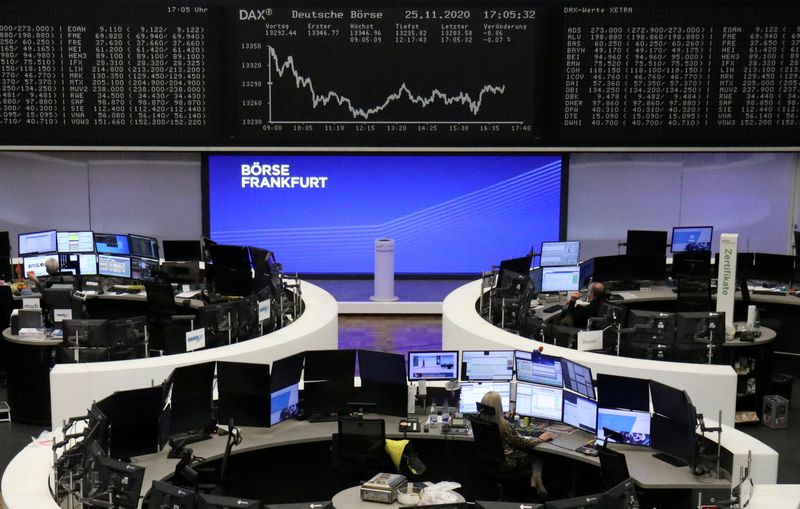This post was originally published on this site
https://i-invdn-com.akamaized.net/trkd-images/LYNXMPEGAT0FB_L.jpg
(Reuters) – Europe’s benchmark stock index was flat on Monday with focus on Brexit negotiations, but was still on track for its best month on record on the prospect of easing coronavirus restrictions and hopes for a COVID-19 vaccine.
After face-to-face talks restarted on Saturday, investors await news of a call between UK Prime Minister Boris Johnson and EU Commission president Ursula von der Leyen, seen as the first sign of movement either towards a trade deal or of talks crumbling five weeks ahead of the deadline.
London’s blue-chip stocks outperformed regional peers to trade up 0.2% as healthcare and industrial shares gained.
While upbeat factory activity data from China kept alive hopes of a global economic recovery, it did little to buoy the pan-European STOXX 600 index after its near 15% surge so far in November.
Gains have been driven by promising trial results for major coronavirus vaccine candidates, and hopes of a more stable U.S. trade policy after Joe Biden’s victory in the U.S. presidential elections.
France’s CAC 40 has jumped almost 22% this month, while Spain’s IBEX and Italy’s MIB gained around 25% each. German shares and UK blue-chips have gained more than 14%.
“The markets have moved so aggressively this month, and there isn’t anything really there to cause any further significant rally,” said Connor Campbell, a financial analyst at Spreadex.
Oil and gas stocks were the biggest decliners in Europe, down 1.7%, with Total SE, BP (NYSE:BP) and Royal Dutch Shell (LON:RDSa) sliding as crude prices fell ahead of a meeting of producer group OPEC+ to decide whether to extend large output cuts.
At the bottom of the STOXX 600 was Dutch bank ABN Amro, down 4.7% after saying it would cut almost 3,000 jobs by 2024.
The economic outlook brightened as slowing COVID-19 infection rates in many European countries encouraged governments to lift some curbs — Britain is due to return to a regional approach to restrictions from Dec. 2, while Ireland will allow shops, restaurants, gyms and pubs serving food to reopen next week.
However, the number of coronavirus cases in Germany remained high, with economic institute Ifo saying a partial lockdown saw the share of companies using short-time work schemes rising in November from the previous month.

